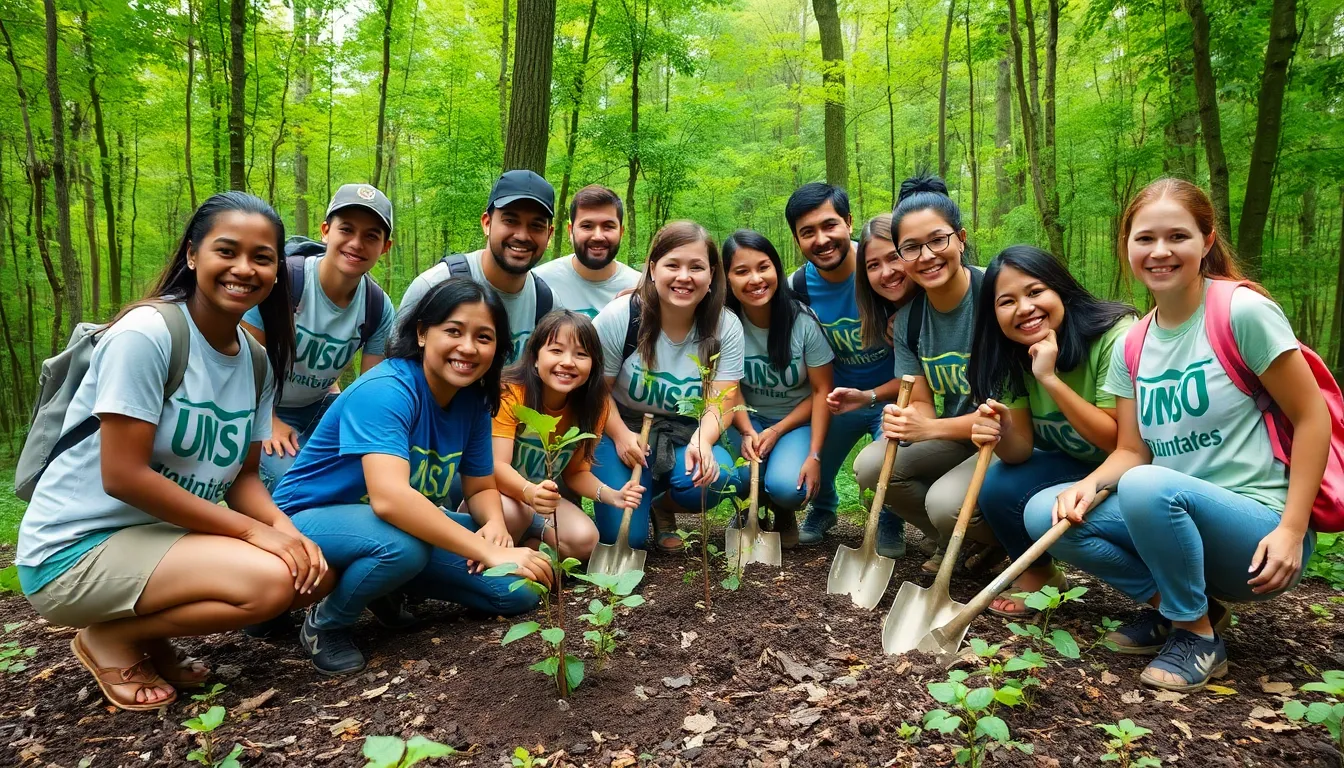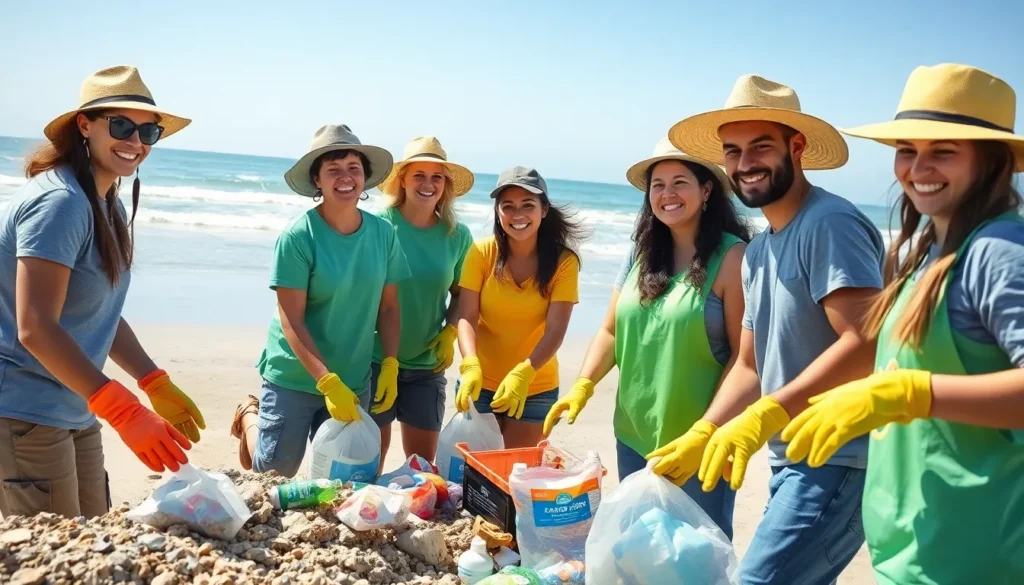Table of Contents
ToggleImagine trading your usual weekend Netflix binge for a chance to save the planet. Sounds like a plot twist in a feel-good movie, right? Conservation volunteering offers a unique opportunity to roll up your sleeves and make a real difference while having a blast. Whether it’s planting trees, rescuing wildlife, or cleaning up beaches, these experiences not only help the environment but also create unforgettable memories and friendships.
What Is Conservation Volunteering?
Conservation volunteering involves actively participating in projects that protect natural resources. Individuals engage in hands-on activities like tree planting and habitat restoration. Various organizations coordinate these efforts, focusing on areas such as wildlife preservation and environmental education.
Participants in conservation volunteering can choose from diverse opportunities. Local community groups often organize beach clean-ups to remove plastic debris. Wildlife shelters frequently seek volunteers to aid in animal rehabilitation efforts. Additionally, global initiatives offer programs for those interested in exploring international conservation work.
Those involved in conservation volunteering experience benefits beyond environmental impact. Building friendships with like-minded individuals enhances social connections. Gaining new skills in ecological management fosters personal growth and career development. Many volunteers report increased awareness of sustainability issues, which influences their lifestyles and choices.
Conservation volunteering serves as a meaningful alternative to typical recreational activities. By dedicating time to protect the planet, each individual acts as a steward for future generations. The combination of hard work and connection to nature creates lasting memories while fostering a deeper appreciation for the environment.
Benefits of Conservation Volunteering

Conservation volunteering offers a range of benefits for individuals and the environment. Engaging in these activities creates positive change while enriching personal experiences.
Environmental Impact
Participating in conservation projects significantly benefits ecosystems. Planting trees restores habitats and enhances biodiversity. Cleaning beaches helps protect marine life and reduces pollution. Volunteers contribute to wildlife rescue, aiding endangered species survival. These hands-on efforts elevate awareness of environmental issues and foster a connection with nature. Collective action can lead to measurable improvements in wildlife populations and habitat quality. Ultimately, involvement in conservation directly affects the health of the planet, promoting a sustainable future.
Personal Growth
Volunteering fosters personal development and cultivates valuable skills. Individuals learn teamwork and leadership through collaborative projects. Engaging in diverse tasks builds adaptability and problem-solving abilities. Volunteers often gain knowledge about sustainability practices, enhancing their understanding of ecological issues. Building relationships with like-minded individuals nurtures a sense of community and belonging. Increased confidence frequently results from overcoming challenges associated with conservation efforts. This growth translates into a greater appreciation for nature, encouraging participants to adopt sustainable lifestyles beyond their volunteer experiences.
How to Get Involved in Conservation Volunteering
Getting involved in conservation volunteering offers individuals the chance to contribute meaningfully to environmental efforts while connecting with others. By taking the right steps, individuals can find rewarding opportunities aligned with their interests.
Finding Volunteer Opportunities
Research local organizations that focus on conservation efforts. Websites like Idealist or VolunteerMatch list numerous projects available in various regions. Many non-profits host events such as beach clean-ups or tree planting days. Signs for these events often appear at community centers or social media platforms. Engaging with local conservation groups helps individuals learn about upcoming initiatives. Networking with friends or family who have volunteered can lead to fruitful connections. Exploring international programs also provides unique chances to work on diverse environmental challenges.
Preparing for Your Experience
Preparing for a conservation volunteering experience involves several important steps. Research the organization and understand its mission and values. Gathering necessary supplies, such as work gloves and reusable water bottles, enhances participation. Participants should also review any guidelines or training materials provided by the organization. Clothing should be comfortable and appropriate for outdoor activities. Getting familiar with the location and its climate helps ensure a positive experience. Setting personal goals for the volunteering experience fosters personal growth and community impact.
Challenges of Conservation Volunteering
Conservation volunteering presents various challenges that participants encounter during their commitments. Understanding these obstacles prepares volunteers for a more fulfilling experience.
Physical and Emotional Demands
Physical and emotional demands often arise during conservation volunteering. Participants may complete physically strenuous tasks like trail maintenance and habitat restoration. Long hours under various weather conditions can lead to fatigue. Emotional resilience plays a crucial role; witnessing environmental degradation can be disheartening. Volunteers must maintain a positive outlook and stay motivated despite setbacks. Joining a supportive group often helps in managing these challenges effectively. Building connections with other volunteers fosters a sense of camaraderie, providing both physical and emotional support.
Navigating Cultural Differences
Navigating cultural differences presents another challenge for conservation volunteers. Many opportunities exist in diverse settings, exposing individuals to unique customs and local perspectives. Respecting local culture enhances interactions with community members and fosters positive relationships. Participants may encounter language barriers that complicate communication. Learning basic phrases or using translation apps promotes better understanding. Adapting to different norms and practices also requires openness and flexibility. Engaging with locals enriches the volunteering experience, highlighting the intricate ties between conservation and cultural appreciation.
Conservation volunteering offers a unique opportunity for individuals to make a meaningful impact on the environment while enriching their own lives. By participating in hands-on projects, volunteers not only contribute to vital ecological efforts but also forge connections that can last a lifetime.
This experience fosters personal growth and a deeper understanding of sustainability, encouraging participants to adopt eco-friendly practices beyond their time spent volunteering. As they engage with diverse communities and face various challenges, volunteers emerge with a renewed sense of purpose and a commitment to protecting the planet.
Choosing conservation volunteering transforms weekends into impactful experiences that resonate far beyond the immediate moment. It’s a chance to become a steward of the Earth, ensuring a healthier environment for future generations.




